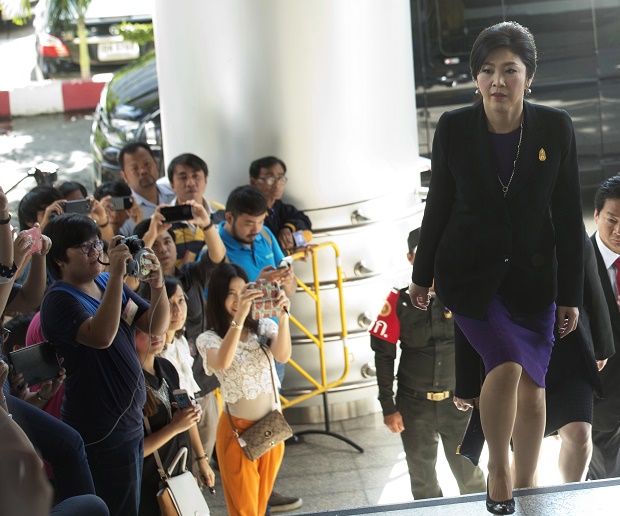
Thailand’s former Prime Minister Yingluck Shinawatra arrives at Bangkok’s Criminal Court, Thailand, Tuesday, Sept. 29, 2015. Yingluck filed a criminal case at the court to counter-sue the country’s attorney-general over the handling of her prosecution in connection with a subsidy scheme for rice farmers, which ran up huge losses. AP
BANGKOK — Thailand’s ousted prime minister Yingluck Shinawatra, who was pushed from office more than a year ago, impeached and faces criminal charges, hit back at her opponents Tuesday with her own lawsuit.
Yingluck filed a case at Bangkok’s Criminal Court to counter-sue the country’s attorney-general over the handling of her prosecution in connection with a subsidy scheme for rice farmers, which ran up huge losses.
The lawsuit is another twist in a long-standing political battle dividing Thailand. On one side is the country’s traditional ruling elite who are backed by the military that staged Thailand’s 2014 coup, and on the other is a group of politicians who challenged the status quo, led by Yingluck’s brother, Thaksin Shinawatra, a telecommunications billionaire-turned-populist politician who held office from 2001 to 2006.
Yingluck was Thailand’s prime minister from 2011 until a controversial court decision forced her from office in May 2014, just a few days before the military staged a coup to overthrow her government. She was impeached earlier this year in connection with the money-losing rice subsidy scheme and barred her from office for five years. The attorney-general then pressed criminal charges against her over the same matter.
In her court filing Tuesday, Yingluck said the attorney-general and others were guilty of negligence of duty and a concerted effort to damage her, citing three alleged legal violations punishable by a range of 6 months to 10 years in prison. The court will decide whether to let the case proceed or throw it out.
“I’ve come here to exercise my rights in accordance with the legal process,” Yingluck told reporters. “I submitted the lawsuit against the attorney-general and team members.”
The rice subsidy scheme was a key feature of Yingluck’s 2011 election campaign and helped win her huge support in rural areas. It bought rice from farmers at well above market price but the program racked up losses of at least $4.46 billion.
Yingluck’s opponents said the scheme was riddled with corruption and she did nothing to stop it. She denies any wrongdoing.
Yingluck was accompanied by her brother-in-law, Somchai Wongsawat, himself a former prime minister who was also ousted by the courts, in a 2008 decision.
Both Yingluck and Somchai are political allies and relatives of Thaksin, who was ousted by a 2006 military coup. Yingluck is Thaksin’s sister and Somchai is married to another of Thaksin’s sisters.
Thaksin fled into exile in 2008 to avoid a prison sentence on a corruption-related charge he says was engineered by his political foes, jealous of his popularity.
The courts and the military, two pillars of the conservative Thai establishment, have consistently acted to put pressure on Thaksin’s political machine, which has delivered convincing victories in all national elections since 2001. He remains highly popular in rural areas.
The anti-Thaksin efforts have eased recently as the army consolidates its rule over the country, seeking to achieve a measure of reconciliation while putting in safeguards against a comeback by Thaksin and his allies. The junta says a new election won’t take place in Thailand until 2017.
RELATED STORIES
Thai ex-premier Yingluck impeached, faces criminal charges
Thai prosecutors press criminal charges against ex-PM
Human Rights Watch denounces Thai junta, martial rule